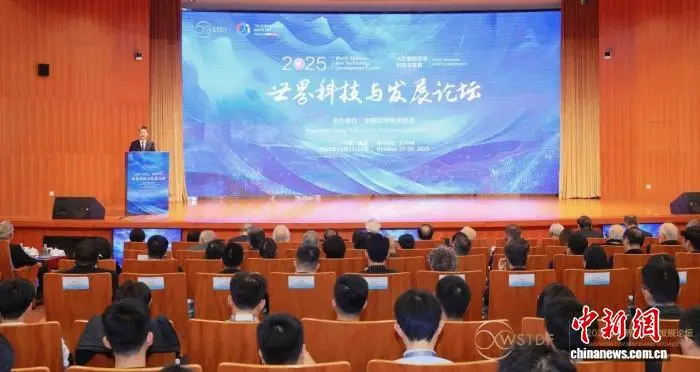Global science leaders converged in Beijing as the 2025 World Science and Technology Development Forum (WSTDF) kicked off on October 27. The forum, now in its seventh year since being launched by the China Association for Science and Technology (CAST) in 2019, brings together global experts to explore how artificial intelligence can advance science, industry, and sustainability.

The 2025 World Science and Technology Development Forum (WSTDF) kicks off in Beijing on October 27, 2025.
The three-day event tackles four critical areas: artificial intelligence shaping future industries, green technologies revitalizing traditional sectors, a groundbreaking "One Health" paradigm in medical and engineering integration, and the role of open science in fostering global collaboration. Discussions aim to spark an intelligent economy and society, powered by human-machine synergy, interdisciplinary breakthroughs, and shared innovation.
Opening remarks came from representatives of key international bodies, including the International Science Council, the International Society for Photogrammetry and Remote Sensing, the Science Family of Journals at the American Association for the Advancement of Science, and South Africa’s Department of Science, Technology and Innovation (DSI). CAST outlined a forward-looking vision centered on innovation-driven transformation, deeper cross-sector integration, and more robust scientific exchange, calling on the global community to embrace intelligent, green, and inclusive approaches to development.
The day’s keynote session featured compelling presentations showcasing technology’s future potential. Speakers included Nicholas Dirks, President and CEO of the New York Academy of Sciences; Guo Huadong, Director General of the International Research Center of Big Data for Sustainable Development Goals (CBAS); Manzoor Hussain Soomro, Founding President of the Economic Cooperation Organization Science Foundation (ECOSF); Wang Jian, President of Zhejiang Lab; Michael Meadows, Professor at Nanjing University and former President of the International Geographical Union; and Wu Tian, Executive Vice President of Baidu Group. Their talks spanned the promises and perils of AI in science and explored the impact of deep learning on industrial transformation and sustainability.
Five groundbreaking reports debuted at the ceremony, including the IUPAC Top Ten Emerging Technologies in Chemistry 2025 and the Global-Scale Sustainable Development Scientific Monitoring Report (2025), alongside innovations in hydrogen energy, smart manufacturing standards, and open science platforms.
The forum continued through October 29 with ten parallel sessions on cutting-edge subjects from embodied intelligence and green hydrogen to digital earth and sustainable futures, complemented by high-level events like the World Laureates Forum and the China-Russia Engineering and Technology Forum to deepen international scientific ties.
Source: The official WeChat account of the China Center for International Science and Technology Exchange (CISTE).